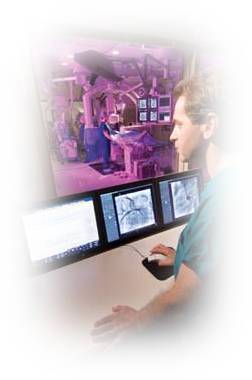Through basic but invaluable tools, as in the data recorded in an ECG, many suspected arrythmia problems are first spotted. Your primary care physician or diagnostic cardiologist may have ordered an ECG test as part of your routine examination or because you specifically indicated to your physician in their office your heart has been racing lately or you have been experiencing dizzy spells. Perhaps your physician sent you home with an event monitoring device which can automatically record your heart's activity (ECG) which then can be sent directly to your physician's office or an authorized ECG technician over the phone or via the Internet. In some situations you felt something was just not right and went to an an emergency room and an ECG was taken there. If your primary physician makes a definite diagnosis that you have cardiac arrythmia or suspects a high probablity you might, he or she would seek the expertise of a cardiac electrophysiologist (EP) physician. The EP cardiologists has specific training in the specific diagnosis and treatment of cardiac arrythmia. Following, is a description of the usual first steps your EP physician would take, the specific technology "tools" used in this first step and the goal of the step.
Goal: To determine the type of arrythmia you might have, the exact location of the arrythmia source within your heart's chambers and to determine the best therapy for you moving forward.
Essential Tools: diagnostic EP catheter, X-ray and PC based technology to display the catheter data
Step Two will be discussed in detail in the next few days. I welcome any and all comments and additions from professionals or patient consumers.
Regards,
Jim
James Accord
Atlanta, GA
COAFEX Consumer Oriented Atrial Fibrillation ExperienceExchange
Wednesday, November 11, 2009
Subscribe to:
Comments (Atom)
COAFEX Consumer Oriented Atrial Fibrillation Experience Xchange
Approximately two million people in the US have atrial fibrillation. Fifty FDA approved drugs exist to treat AF, none which currently offer a cure. Advances in medical technology has given AF patients a promising curative therapy option. The procedure, known as Atrial Fibrillation Radio Frequency Catheter Ablation or AF Ablation, has been performed on thousands of AF patients over the past few years. Much data exists describing the symptoms of AF, the best heart centers to have an AF ablation procedure and the most experienced cardiology specialists (Electrophysiologists) to perform the procedure. However, the personal stories from YOU, the patient consumer, seems to be data not easily found, hence the purpose of this blog site. We invite you to share in your words, from your own experience, your AF ablation story. How long have you had AF? What was your path to diagnosis? How did you decide on your hospital treatment center and your physician to perform the procedure? How has your AF changed since the ablation? Your stories represent the most powerful voice in health care. The information you choose to share will be shared with hospitals and physicians all over the world. This information exchange will be an invaluable measuring stick in determining how effective AF ablation has been to date and how to broaden access to care for the hundreds of thousands considering or waiting on an AF ablation.
COAFEX Founder
I have been involved in the arrythmia management industry,of which atrial fibrillation is a part, for almost 20 years. My focus has been in the business development of new technology. I have worked in some capacity, for every major technology company in atrial fibrillation ablation. I have traveled the world interacting with physician thought leaders and heart centers.
Search This Blog
Followers
Bio

- Jim Accord
- Roswell, Georgia, United States
- Married 33 years to my hometown sweetheart,Susie. We have 5 kids; 4 girls, 25,23,19 and 15 and a son who is 21.

